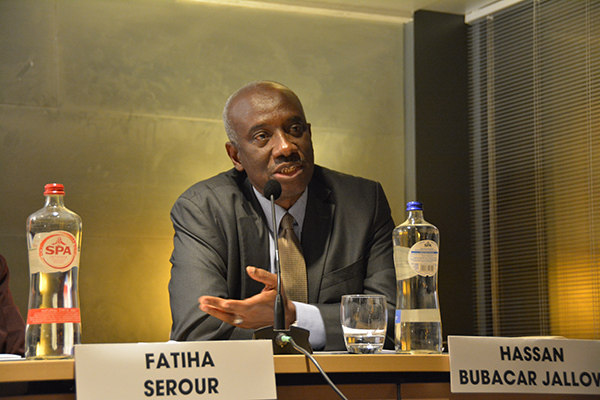The Wayamo Foundation is proud to announce the formation of the Africa Group for Justice and Accountability, an independent group of senior African experts on international criminal law and human rights, including political figures, members of international and domestic tribunals, and human rights advocates.
The group will support efforts to strengthen justice and accountability measures in Africa through domestic and regional capacity building, advice and outreach, and enhancing cooperation between Africa and the International Criminal Court.
The members of the Africa Group for Justice and Accountability are:
- Femi Falana (Nigeria) Human rights activist and lawyer
- Hassan Bubacar Jallow (Gambia) Prosecutor at the International Criminal Tribunal for Rwanda and International Residual Mechanism for Criminal Tribunals
- Richard Goldstone (South Africa) Former Chief Prosecutor of the United Nations International Criminal Tribunal for Rwanda and the former Yugoslavia
- Athaliah Molokomme (Botswana) Attorney General of Botswana
- Betty Kaari Murungi (Kenya) Independent Consultant on Human Rights and Transitional Justice
- Mohamed Chande Othman (Tanzania) Chief Justice of Tanzania
- Navi Pillay (South Africa) Former UN High Commissioner for Human Rights
- Fatiha Serour (Algeria) Director of Serour Associates for Inclusion and Equity
- Abdul Tejan-Cole (Sierra Leone) Executive Director of the Open Society Initiative for West Africa
At the launch event, held on the sidelines of the International Criminal Court Assembly of States Parties on 23 November 2015 in the Hague, Bettina Ambach, the Director of the Wayamo Foundation, which will act as the Groups’ Secretariat, described it as “an open and interactive forum where the concerns of African citizens and states can be heard.”
Speaking at the same event, Attorney General Athaliah Molokomme said: “All of us in this group share a conviction that human rights are universal and inalienable, that no one should be victimized, and that the international system must rise above any differences to fight the scourge of impunity.”
She added that: “I have a strong belief that all efforts have to be put into fighting impunity and injustice at all levels, be it at the national level, regional level, or international level. As a group, we should be able to complement the efforts of others who are already making a contribution and I am very confident that with the collective experience and commitment of the members we will collaborate with everyone to improve the interaction between Africa and the ICC.”
Echoing the same sentiments, Director of Serour Associates Fatiha Serour said: “Our group is going to be important in trying to bridge the gap between the policy and the actual practice. There is a lot we can do in terms of advocacy, training and advice and we need to be honest with ourselves: Fighting for justice is a basic thing that any decent person should do and should support.”
For his part Prosecutor Hassan Jallow felt that despite many challenges: “Africa has had a long and abiding commitment to justice, accountability and human rights.” Jallow added that: “After all, much of the content of the modern law of human rights owes its origin to the struggles of the African peoples and the peoples in the third world for liberation, independence and emancipation.”
Another Group Member and former UN High Commissioner for Human Rights, Navi Pillay, emphasized the need for such a group, noting that: “It is very important to have a group that will focus on information, education, and capacity building, a group that will work very closely with civil society organisations.” She added that: “As I look back, I can see that Africans consistently supported the principle of ending impunity and they truly appreciated it because for years they had to deal with dictators who then escaped justice.”
The former Chief Prosecutor of the United Nations International Criminal Tribunal for Rwanda and the former Yugoslavia Richard Goldstone spoke about the deplorable double standards in international criminal justice, as not all war crimes are committed in Africa but are out of reach of the ICC. “Our Africa Group should fight these double standards by improving the system. It’s the double standards that should be fought and not the institution that has been set up to exactly avoid the effect of those double standards.”
The renowned human rights lawyer Femi Falana said: “We must continue to demand for justice for victims of human rights violations and fight impunity on the African continent. We need to encourage national and regional courts to take on cases of grave international crimes.”
The launch of the Africa Group for Justice and Accountability was witnessed by state representatives, judges, journalists, civil society representatives and African parliamentarians at the side event entitled “Africa and the ICC – Looking Back, Moving Forward” co-hosted by the governments of Botswana, Finland, Germany, the Netherlands, Norway, Sweden, Switzerland, and the United Kingdom.
Judge Silvia Fernández de Gurmendi, the President of the ICC who also spoke at the event, summed up the general opinion of the participants, that: “The Court’s relationship with Africa is vital to its success, and the Africa Group for Justice and Accountability can add an important, independent voice to the discussions on the way forward.”
She concluded by saying: “I was heartened by the Group’s mission statement: Who better to deal with these problems than people who have an intimate understanding of their own regions and a huge expertise in justice and human rights.”


